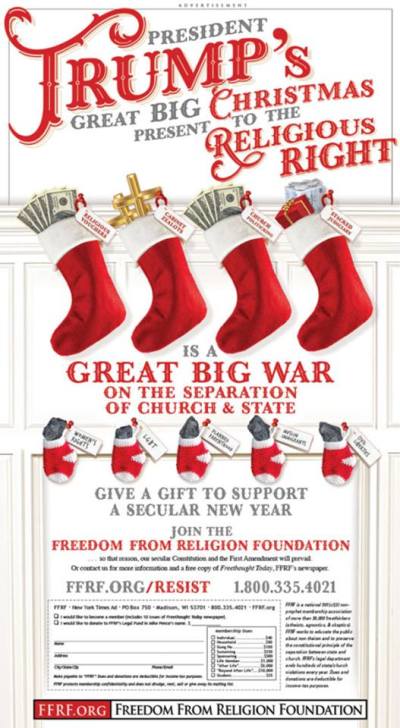FFRF Attacks Trump for Signing Religious Freedom Executive Order in NY Times Christmas Ad

A prominent atheist group that in the past has claimed that Christians "stole Christmas" has now put out a full-page ad in The New York Times accusing President Donald Trump of "waging war" on the separation of church and state.
The Freedom From Religion Foundation, which said that the ad was scheduled to appear in the newspaper on Thursday, claims that Trump is carrying out an "all-out assault on the First Amendment."
FFRF Co-Founder Annie Laurie Gaylor said the ad, which also argues that Trump has disparaged women's rights, LGBT people, Muslim immigrants, civil liberties, and Planned Parenthood, is partly aimed at Trump's "Merry Christmas" proclamations.
"There's no 'war on Christmas,'" Gaylor argued.
"That's Fox News' phony construct. But there most definitely is a concerted war on the First Amendment's cherished principle of separation between government and religion," she added.
Throughout his election campaign, and this December as his first year as president, Trump has said that he will encourage Americans to say "Merry Christmas" again and not to be silenced.
FFRF Co-President Dan Barker, who was once a self-described conservative evangelist who shared the Gospel of Jesus Christ, added: "While we kept the tone of our message light, we don't minimize the grave harm already inflicted on America's wall of separation between church and state."
As an example of such alleged harm he listed Trump's executive order on religious freedom in May, which was designed to "protect and vigorously promote religious liberty" and "alleviate the burden" of the Johnson Amendment, which prohibits tax-exempt religious organizations from taking part in political activity.
On Thursday, FFRF put up a separate post on Facebook recalling the words of the late co-founder Anne Nicol Gaylor, who was a pro-choice abortion activist, who once said that Christmas celebrates the birthday of a Roman sun deity, and not Jesus Christ.
"For a fact, the Christians stole Christmas. We don't mind sharing the season with them, but we don't like their pretense that it is the birthday of Jesus. It is the birthday of the Unconquered Sun — Dies Natalis Invicti Solis," the message read.
"Christmas is a relic of sun worship. For all of our major festivals, there were corresponding pagan festivals tied to natural events. We've been celebrating the Winter Solstice, this natural holiday, long before Christians crashed the party," the post added.
"We nonbelievers are quite willing to celebrate the fun parts of anybody's holidays. We just want to be spared the schmaltz, the superstition — and the state/church entanglements."
The argument that Christmas is actually a pagan holiday has been made many times in the past, though some, such as Kevin T. Bauder, research professor of Historical and Systematic Theology at Central Baptist Theological Seminary in Plymouth, Minnesota, have said that it does not hold much water.
"Much of this argument is based on speculation. The much-repeated suggestion that the date of Christmas and the custom of gift-giving were copied from the Roman Saturnalia is an example of such speculation. Little real evidence exists to support it," Bauder argued in an op-ed for The Christian Post on Wednesday.
"True, late Romans do seem to have exchanged gifts around the Saturnalia, which was observed toward the end of December and beginning of January. The question, however, is who influenced whom," he added.
"That Christians borrowed the celebration from pagans is a conceit of the Enlightenment. It could just as easily have been the other way around."
Bauder clarified that it would be more correct to say that there are some Christmas customs that have roots in pagan observances.
"In a civilization that borrows even the names of days and months from pagan polytheism, it would be surprising if no pre-Christian customs were held over in Christian observances," he pointed out.
"In itself, however, a pagan origin does not render those customs any more evil than designating days as Wednesday (Wotan's Day) or Thursday (Thor's Day)."




























